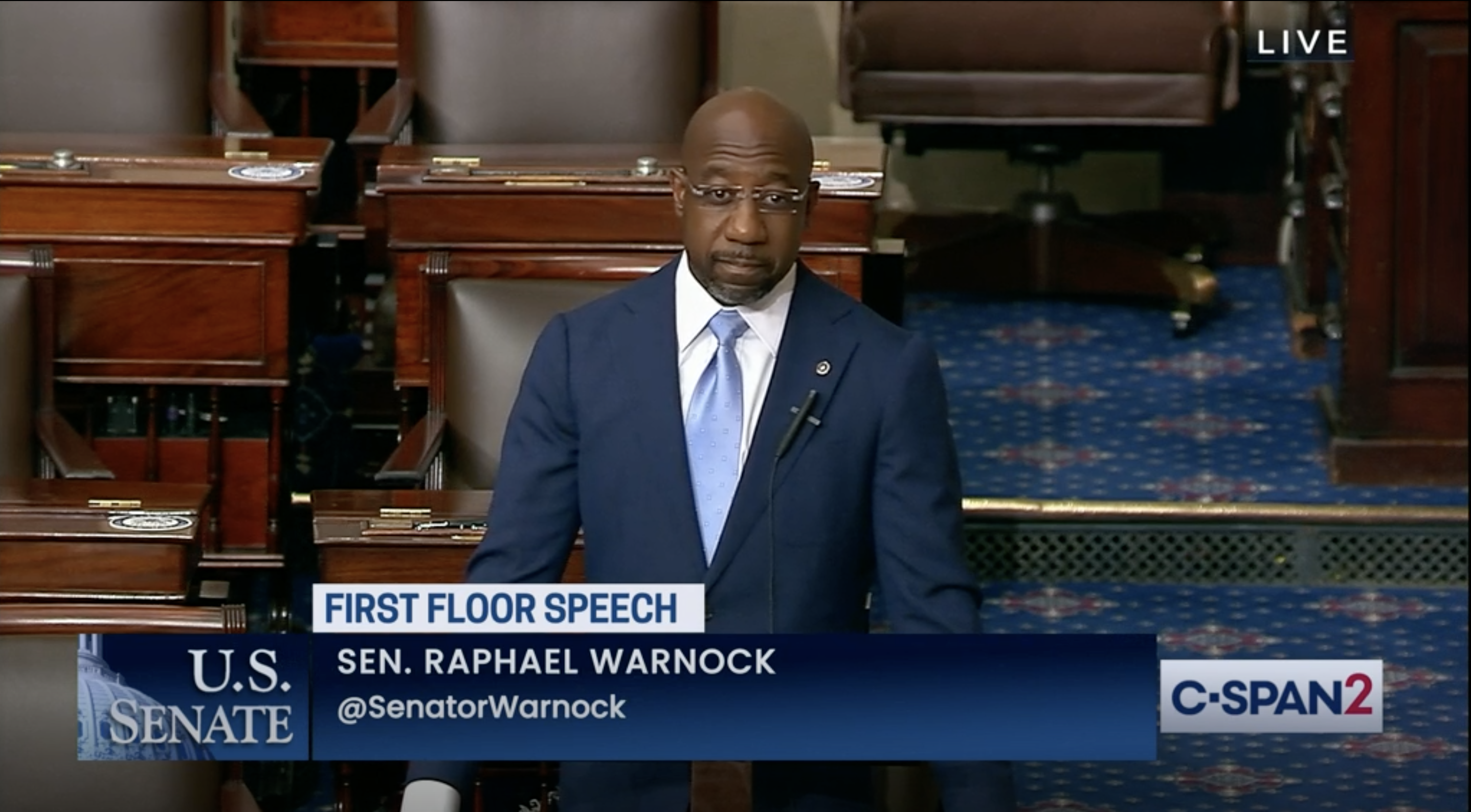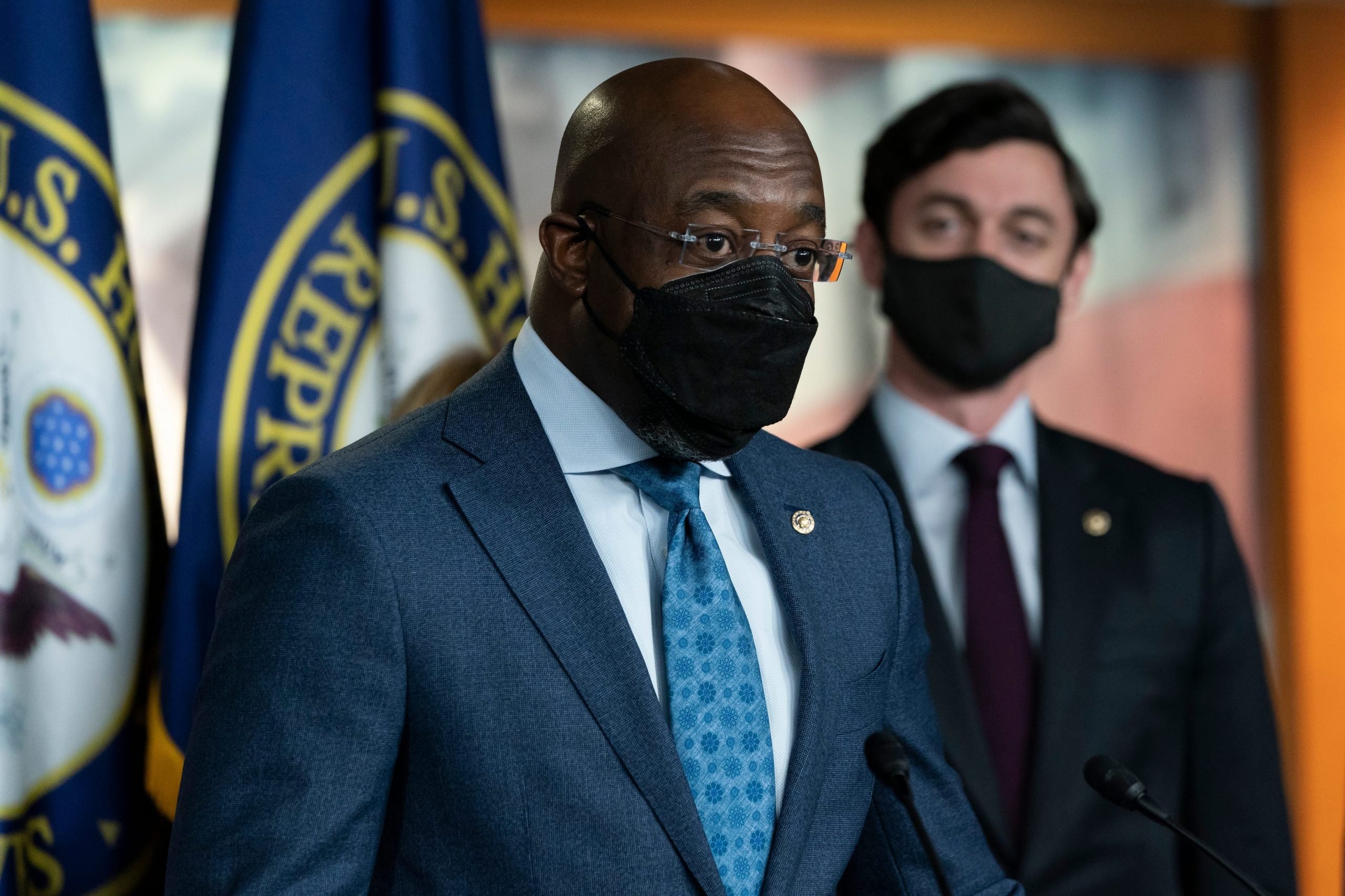
Screenshot/C-SPAN2
- Raphael Warnock used his maiden Senate speech to defend voting rights.
- Warnock rebuked GOP efforts to tighten voting laws after the 2020 presidential election.
- The senator argued that enacting harsh voting restrictions only diminishes American democracy.
- See more stories on Insider's business page.
When Sen. Raphael Warnock of Georgia entered the Senate chamber on Wednesday to deliver his maiden floor speech, his impassioned call for voting rights evoked the worldly messages of his Sunday sermons at the historic Ebenezer Baptist Church in Atlanta.
Warnock is the first Black Democratic senator to be elected from the Southern state and presides over the same church that the Rev. Dr. Martin Luther King Jr. once led, which has already made him a sought-after voice on Capitol Hill.
However, it was his speech's laserlike focus on voter suppression that led to a standing ovation in the Senate chamber, with his words systematically dismantling the GOP-backed voting restrictions that have festered in his home state and spread across the country in the wake of former President Donald Trump's efforts to discredit his election loss to President Joe Biden.
Blocking a return to an earlier era
In January, Warnock defeated appointed GOP Sen. Kelly Loeffler in a special runoff election to fill the remaining term of former Republican Sen. Johnny Isakson, while Sen. Jon Ossoff defeated former Sen. David Perdue for a full-six year term, on the heels of President Joe Biden last November becoming the first Democratic presidential nominee to win the state since 1992.
-Senator Reverend Raphael Warnock (@SenatorWarnock) March 17, 2021
Georgia, which for generations after Reconstruction oversaw a terror campaign against its Black citizens through discriminatory Jim Crow laws, became a cradle of the Civil Rights Movement in the 1950s and 1960s while emerging as a leading economic powerhouse of the South.
Warnock, who sees his background as part of the struggle for equality in the Deep South, used his first Senate speech to call out any infringement of voting rights.
"We are witnessing right now a massive and unabashed assault on voting rights and voter access unlike anything we have seen since the Jim Crow era," he said. "This is Jim Crow in new clothes."
He added: "One person, one vote is being threatened right now. Politicians in my home state and all across America, in their craven lust for power, have launched a full-fledged assault on voting rights."
Warnock framed voting rights as the very soul of a functioning American democracy and called for the passage of the sweeping Democratic-backed voting reform bill, known as H.R. 1 or the For the People Act, which would expand early and absentee voting, set national standards for voter registration, and curb voter purges, among other reforms.
While the bill passed the House, it faces a difficult future in the Senate due to the 60-vote threshold to overcome a legislative filibuster, which is virtually guaranteed with intense opposition from leading Republicans, including former Vice President Mike Pence, who described H.R. 1 as an "unconstitutional power grab."
Warnock accused Senate Republicans of opposing the bill in a bid to claw back power.
"They are focused on winning at any cost, even the cost of the democracy itself," he said. "I submit that it is the job of each citizen to stand up for the voting rights of every citizen. And it is the job of this body to do all that it can to defend the viability of our democracy."
Voting rights are 'bigger than the filibuster'
Over the past few weeks, GOP-backed voting proposals in Georgia, which are still being deliberated in the state legislature, called for everything from eliminating Sunday early voting times that are popular with Black voters to restricting ballot drop boxes.

AP Photo/Alex Brandon
Warnock rebuked the frenetic push to enact restrictive legislation as rooted in Trump's monthslong disinformation campaign surrounding the 2020 presidential election.
"Politicians driven by that big lie aim to severely limit, and in some cases eliminate, automatic and same-day voter registration, mail-in and absentee voting, and early voting and weekend voting," he said. "They want to make it easier to purge voters from the voting roll altogether. As a voting rights activist, I've seen up close just how draconian these measures can be."
Warnock argued that the preservation of voting rights "is bigger than the filibuster," evoking the legacy of the late civil rights leader and Congressman John Lewis of Georgia, a trusted friend of the senator and namesake of the John Lewis Voting Rights Advancement Act, which would restore key provisions of the Voting Rights Act of 1965.
"I stand before you saying that this issue - access to voting and preempting politicians' efforts to restrict voting - is so fundamental to our democracy that it is too important to be held hostage by a Senate rule, especially one historically used to restrict the expansion of voting rights," he added. "It is a contradiction to say we must protect minority rights in the Senate while refusing to protect minority rights in the society."
Going back to his own background, Warnock linked the fight for voting rights to his own family, recounting the story of how his mother, who once worked in cotton fields in segregation-era Georgia, was able to vote for him in a free and open election.
"Because this is America, the 82-year-old hands that used to pick somebody else's cotton went to the polls in January and picked her youngest son to be a United States senator," he emphasized.